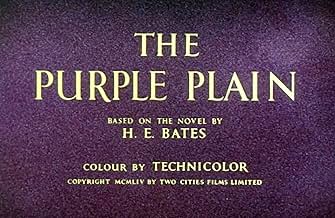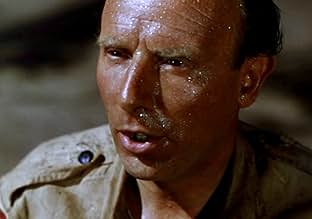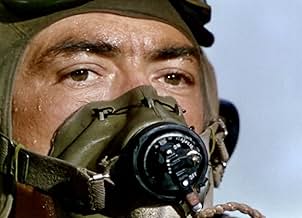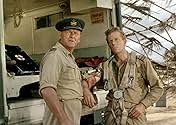NOTE IMDb
6,5/10
2,6 k
MA NOTE
Ajouter une intrigue dans votre langueIn World War II Burma, a Canadian bomber pilot becomes reckless after losing his bride in a Luftwaffe air raid.In World War II Burma, a Canadian bomber pilot becomes reckless after losing his bride in a Luftwaffe air raid.In World War II Burma, a Canadian bomber pilot becomes reckless after losing his bride in a Luftwaffe air raid.
- Réalisation
- Scénario
- Casting principal
- Nomination aux 4 BAFTA Awards
- 4 nominations au total
Brenda de Banzie
- Miss McNab
- (as Brenda De Banzie)
Dorothy Alison
- Nurse
- (non crédité)
Peter Arne
- Flight Lieutenant
- (non crédité)
Ernest Blyth
- Man Dancing at Wedding
- (non crédité)
Richard Duke
- Nightclub Patron on Dance Floor
- (non crédité)
Jack McNaughton
- Sgt. Ralph Brown
- (non crédité)
Lane Meddick
- Radio Operator
- (non crédité)
Harold Siddons
- Navigator Williams
- (non crédité)
Mya Mya Spencer
- Dorothy
- (non crédité)
Avis à la une
I suppose the reason why I loved the film so much was that I was actually watching the film being made in Sigaria in Ceylon (Now Sri Lanka). I was part of an RAF Police team from RAF Columbo called to investigate the theft of some property from the set of the film. The visit also gave me the opportunity to actually have breakfast with Grgory Peck before the days shooting. I was astounded by the amount of detail that went into the making of the film, and the amount of responsibility put upon Jean, the continuity girl. Gregory Peck was a perfect gentleman, and I was so proud to actually be introduced to him by Brummie Benson, an RAF extra on the film set. To me, the film depicted courage at it's best, and as said by a previous critic , a simple story, with no over blown heroics,a good and believable cast, and a most enjoyable though somewhat predictable conclusion. But, NO bad language..... It's a pity more films of today cannot follow the same pattern. In all a very good example of the Royal Air Force at it's humble best, and a credit to the J.Arthur Rank Studios for its production
A really fine film and quite remarkable especially for it's time; shot on location (Ceylon standing in for Burma) in color and with an actual Burmese woman for the female romantic lead. As a war film the pacing and lack of any real 'battle scenes' might disappoint a few people. But the film is at its core is a character study of a RAF pilot (Peck) who has 'gone round the bend' suffering from what we'd call PTSD today and how his battle with it consumes him as much as the war with the Japanese.
The other major character - other that the wonderful Win Min Than as the 'love interest' - is the location itself. 'Location as Charter' is something that David Lean latter became famous for but here in this film the immense expanse of jungle and plain becomes a beautiful but deadly antagonist The 'actual enemy', the Japanese Army, is tellingly, never seen.
As this is a British film all the performances (except for -shockingly- the one Scotswoman in the film) are nicely understated. At one point Peck's character admits that he has been trying to get himself killed in battle ever since the death of his wife to which he drolly adds ' you think that would be pretty easy in a war....but all they kept doing was giving me medals....' WWII airplane geeks ( guilty as charged) will appreciate the shots of the De Haviland Mosquitoes in operation.
The other major character - other that the wonderful Win Min Than as the 'love interest' - is the location itself. 'Location as Charter' is something that David Lean latter became famous for but here in this film the immense expanse of jungle and plain becomes a beautiful but deadly antagonist The 'actual enemy', the Japanese Army, is tellingly, never seen.
As this is a British film all the performances (except for -shockingly- the one Scotswoman in the film) are nicely understated. At one point Peck's character admits that he has been trying to get himself killed in battle ever since the death of his wife to which he drolly adds ' you think that would be pretty easy in a war....but all they kept doing was giving me medals....' WWII airplane geeks ( guilty as charged) will appreciate the shots of the De Haviland Mosquitoes in operation.
Purple Plain is an obscure film in Peck's long list of movie credits. I don't know if this British production got much publicity or release stateside, despite Peck's movie star celebrity. Unfortunately, it's never been a TV regular, which is too bad because this tale of renewal and survival is an unusual and gripping one, in spite of the obscurity.
The film opens in the Burmese jungle during WWII. Peck is a battle fatigued flyer on the ragged edge of breakdown. He's about to be relieved because of erratic behavior, all the while he's flashing back on his wife's death in a London air-raid. These are well-done scenes causing us to sympathize with his loss. Nonetheless, he's jeopardizing his comrades with reckless manuevers because the loss has undermined his will-to-live. Thus, we're torn between sympathy and concern, just like the flight station doctor (Bernard Lee).
In an interesting move, Lee overcomes Peck's agonies by reconnecting him socially, in this case with a nearby missionary community. There Peck finds the vital human relationships so importantly missing from his death-dealing combat duties. As a result, his life takes on new meaning and purpose as a result of rejoining a human community where such life-giving affirmations can emerge. On the whole these are well-done scenes, especially the chaos from the Japanese air attack. In the midst of the carnage, Peck's combat flyer finds a new role in helping to bandage up survivors. Herein lies the movie's basic message and it's an important and humane one, conveyed in fairly subtle fashion, though the turn-around occurs more quickly than I would have liked.
Nonetheless, it's interesting that the script avoids the usual officially sanctioned head-doctor therapies. Note that Peck is not sent to be counseled by an air force psychiatrist, nor to join a chest-baring therapy group, nor to have his past puzzled together Freudian style. Of course, the happy solution here remains a "movie" solution where-- as we all know-- anything can be made to magically happen. Still, for a war-movie setting, the simple affirmation that mental health lies through nurturing social relations and not through government sanctioned killing remains no less suggestive because of its movie origins.
The remainder of the film amounts to a survival trek through the wilds of southeast Asia. It's a well-filmed and harrowing struggle against a forbidding landscape where the crash survivors must decide between staying put or hiking out against great odds. But most importantly, it's Peck's chance to regain his humanity by facing up to the odds, not just for his own survival, but for his two comrades as well. The movie's final scene could not have been better conceived. Indeed, no words are necessary. On the whole, this is a subtly and well thought out anti-war film, no less effective because it concerns the fate of one man rather than thousands.Too bad that its humane message remains so generally unseen.
The film opens in the Burmese jungle during WWII. Peck is a battle fatigued flyer on the ragged edge of breakdown. He's about to be relieved because of erratic behavior, all the while he's flashing back on his wife's death in a London air-raid. These are well-done scenes causing us to sympathize with his loss. Nonetheless, he's jeopardizing his comrades with reckless manuevers because the loss has undermined his will-to-live. Thus, we're torn between sympathy and concern, just like the flight station doctor (Bernard Lee).
In an interesting move, Lee overcomes Peck's agonies by reconnecting him socially, in this case with a nearby missionary community. There Peck finds the vital human relationships so importantly missing from his death-dealing combat duties. As a result, his life takes on new meaning and purpose as a result of rejoining a human community where such life-giving affirmations can emerge. On the whole these are well-done scenes, especially the chaos from the Japanese air attack. In the midst of the carnage, Peck's combat flyer finds a new role in helping to bandage up survivors. Herein lies the movie's basic message and it's an important and humane one, conveyed in fairly subtle fashion, though the turn-around occurs more quickly than I would have liked.
Nonetheless, it's interesting that the script avoids the usual officially sanctioned head-doctor therapies. Note that Peck is not sent to be counseled by an air force psychiatrist, nor to join a chest-baring therapy group, nor to have his past puzzled together Freudian style. Of course, the happy solution here remains a "movie" solution where-- as we all know-- anything can be made to magically happen. Still, for a war-movie setting, the simple affirmation that mental health lies through nurturing social relations and not through government sanctioned killing remains no less suggestive because of its movie origins.
The remainder of the film amounts to a survival trek through the wilds of southeast Asia. It's a well-filmed and harrowing struggle against a forbidding landscape where the crash survivors must decide between staying put or hiking out against great odds. But most importantly, it's Peck's chance to regain his humanity by facing up to the odds, not just for his own survival, but for his two comrades as well. The movie's final scene could not have been better conceived. Indeed, no words are necessary. On the whole, this is a subtly and well thought out anti-war film, no less effective because it concerns the fate of one man rather than thousands.Too bad that its humane message remains so generally unseen.
A pot-boiler of a Film that is intelligently crafted by Director Robert Parrish. To some it may seem intolerably slow & lacking pace, but to others like myself the Film does something that nearly all Films in the Fifties and indeed many now do not even attempt to achieve, and that is take the time to investigate the main characters in depth and in detail. This is done not via long tracts of dialogue, but via the un-said. In particular Peck and the astonishingly beautiful and talented Win Man Than as 'Anna' develop their relationship in the Film in the subtlest and most delicate of manners. I can find no further information on Win Man Tan, but her performance in this period piece, is one part enchanting, one part mesmerising. We understand fully how Peck's psychiatric problems eventually dissolve as hie begins to find perspective courtesy of love for 'Anna'. This Film is not staggering nor the best piece of Cinema you will ever see, but it is superbly acted, wonderfully cast, sparingly written, adroitly directed, and deserves to be watched by anyone who has a love of Cinema. Recommended, because what we see at our Cinemas today has MUCH to learn from Movie making such as this.
In every era of history where men are pitted against each other, there too great memories are lost and buried. As each loss is created, so too are the haunting images which etch across a soldier's face. Every man's countenance thereafter displays his loneliness and despair. Yet within his heart and soul is the yearning for redemption and another chance to live and love again. This movie called " The Purple Plain " is based on the novel written by H. E. Bates and is wonderfully directed by Robert Parrish. With the vast landscape of the Burmese jungle and it's idyllic locations, we have Bill Forester (Gregory Peck) a lost and war weary squadron leader, Bill Forrester (Gregory Peck) pushing his luck in an apparent attempt to commit suicide. Having lost his wife to the war, he now displays a reckless, carefree attitude boarding on the insane. However, those around him see a mutilated man racked by pain and despair, creating both fear and admiration. A doctor (Bernard Lee) is given a last chance to see if there anyway to save him. The film is a superb offering of Mr.Peck's great talent. In addition we see a great performances by Maurice Denham as Blore and Win Min Than as Anna. All in all, this film is one of the most overlooked milestones in cinematic history. ****
Le saviez-vous
- AnecdotesWin Min Than's husband was so jealous about losing her to the film's "decadent" Hollywood star Gregory Peck, he ordered his wife to eat garlic before romantic scenes with Peck. Fortunately, the production crew was able to convince her husband that Peck and the others were respectful of her so he went home leaving her to finish the picture in peace.
- GaffesWhen Peck's co-pilot looks out at the starboard engine, it is leaking some kind of fluid, but that fluid is running down the side of the engine. It's not showing any sign of what would have to be, at least a 200 mph wind, passing over the nacelle.
- Citations
Anna: It's not good to die inside.
Squadron Leader Bill Forrester: It's like living a bad dream.
Anna: Here we bury the dead in the earth not in our hearts. Is the dream over now?
Squadron Leader Bill Forrester: I think so.
- Crédits fousOpening credits prologue: BURMA 1945
- ConnexionsReferenced in Toon in with Me: On This Day... June 25th (2024)
Meilleurs choix
Connectez-vous pour évaluer et suivre la liste de favoris afin de recevoir des recommandations personnalisées
- How long is The Purple Plain?Alimenté par Alexa
Détails
Box-office
- Budget
- 2 000 000 $US (estimé)
- Durée
- 1h 37min(97 min)
- Couleur
- Rapport de forme
- 1.66 : 1
Contribuer à cette page
Suggérer une modification ou ajouter du contenu manquant


































